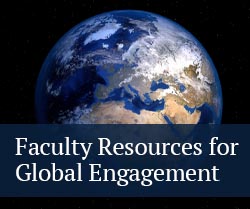
Developing an Online Collaborative Global Course
Global Engineering Engagement (GEE) aims to broaden faculty engagement with designing and implementing global experiences abroad and intercultural learning opportunities on campus for all engineering students in support of the College of Engineering mission.
Faculty across the College of Engineering have already engaged their students in some form of collaborative online international learning with partner institutions abroad. There is different terminology to describe collaborative online international learning and varying approaches to course design.
The opportunity for students in the College of Engineering to connect digitally with peers all over the world provides greater access to global learning experiences. Students develop crucial skills that will help them succeed in their professional career in the twenty-first century. These skills include working in intercultural teams, participating in virtual collaboration, learning about diverse perspectives through an interdisciplinary approach, and engaging in civic professionalism.
Experiential Digital Global Engagement (EDGE)
Penn State’s Experiential Digital Global Engagement (EDGE) program offers support to faculty to build a collaborative relationship with international faculty or to deepen an existing partnership. An EDGE Guidebook has been created to lead interested faculty through the process of designing an EDGE collaborative project.
The EDGE model is a project-based teaching and learning approach that promotes the development of intercultural competence across shared multicultural learning environments through the use of internet-based tools and innovative online pedagogies. EDGE fosters meaningful exchanges between instructors and students with peers in geographically distant locations and from different lingua-cultural backgrounds. EDGE courses, which connect Penn State students with students abroad through a shared course project or projects, emphasize experiential and collaborative student-centered learning.
If you are interested in finding an EDGE partner and have not yet completed the faculty interest form, please do so by using this link. Once you have completed the form, you will be given access to a spreadsheet of international faculty who have also completed the form. If you see a partner of interest or if you are interested in finding a partner from an institution not listed in the spreadsheet, please contact the director in the Center for Global Engineering Engagement, Patrick Tunno (pjt130@psu.edu), to facilitate further introductions to a potential partner abroad.
Additional Resources
The EDGE model is based on SUNY COIL-Collaborative International Online Learning model.
The EDGE Guidebook provides an overview of how to get started at Penn State and a brief history of other faculty experiences with teaching an EDGE course.
Created in 2015, the Stevens Initiative is committed to helping expand the virtual exchange field through three pillars of work: investing in promising programs, sharing knowledge and resources and advocating for virtual exchange adoption.
Access a recording and a copy of the presentation slides for the American Council on Education’s Virtual Exchange COIL Transformation Lab Learning Studio webinar, “Emerging EdTech Options for VE/COIL: Creating Safe Spaces for Innovation and Learning.”



